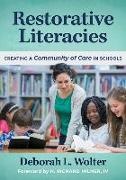Read more
"This book applies the principles of restorative justice to literacy education. Restorative literacies are designed to help educators reach, repair, and restore the literacies of our most disenfranchised and disengaged students in all classrooms through the recognition and expansion of students' experiences and literacies they bring to school. Restorative literacies aim to create a community of care that involves students, teachers, administrators, student's families, and principals so that all students experience racially, culturally, linguistically, and economically responsive, authentic, and engaging instruction in multiple forms of literacies. The practice of restorative literacies focuses on building and strengthening positive relationships between the backgrounds and perspectives, as well as the variable skills, proficiencies, and fluencies, of readers, the multiple texts readers encounter, and the authors of such texts through an intentional system of response, repair, and restoration in an educational setting"--
About the author
Deborah L. Wolter is a retired literacy consultant for Student Intervention and Support Services in Ann Arbor (Michigan) Public Schools. Her books include
Reading Upside Down: Identifying and Addressing Opportunity Gaps in Literacy Instruction. Visit the author's website at deborahwolter.com.
Summary
Through compelling stories of restorative literacies, Wolter explores the complex relationships among cognition, metacognition, identity, behaviour in schools, and literacies. Based on the principles of restorative justice, restorative literacies are designed to help educators repair harm, restore relationships, and expand the concept of literacy.

